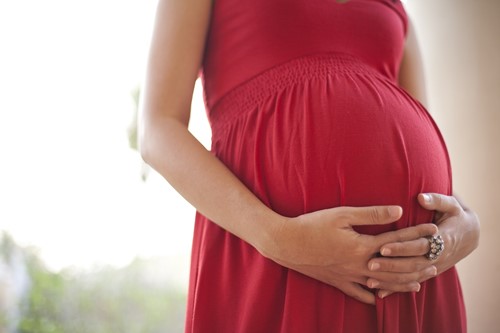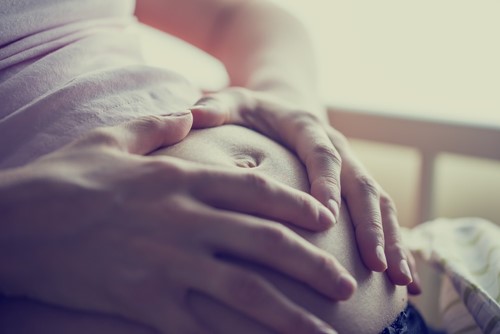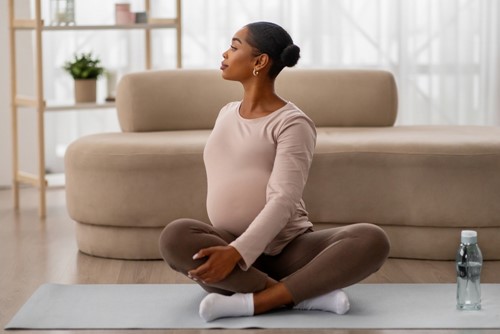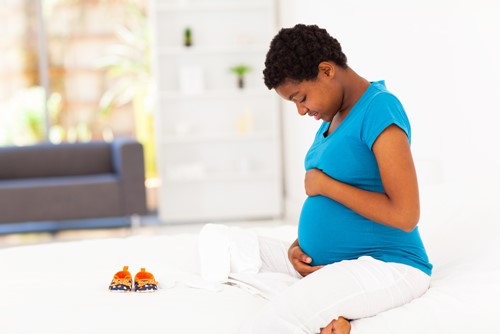Written By Lara Taylor - UK Specialist Midwife
" />The second trimester of pregnancy, between 13- 28 weeks can bring with it a wave of excitement and a new lease of life, as well as relief for some.
Written By Lara Taylor - UK Specialist Midwife
The second trimester of pregnancy, between 13- 28 weeks can bring with it a wave of excitement and a new lease of life, as well as relief for some.
The hormones have started to settle, which can mean common symptoms of early pregnancy may have started to subside.
During pregnancy and in particular the 1st Trimester, many women experience a variety of symptoms that can range from nausea, sickness and fatigue to breast tenderness and mood swings. These symptoms can be reassuring, signalling that the pregnancy is progressing. By the time you have entered your 2nd Trimester, a change, or loss of these symptoms can bring anxiety.
So, what’s actually happening inside the body to make this change so noticeable, and why may you be feeling more energetic?
We’ll first start by looking at the physical and hormonal changes to the body at this time.
I’m a great believer that by having an awareness of what’s going on inside can really help us to understand the symptoms of pregnancy, as well as give a great deal of reassurance. The body really does undergo profound changes to accommodate your growing baby and at the beginning of the 2nd trimester many birthing people find relief, not only from the nausea and sickness that has been forefront, but the extreme tiredness and fatigue….and the breasts may not be feeling so tender and sore.
You may start to experience nasal congestion caused by the increase in blood volume and swelling to the blood vessels in the nose.
You’ll likely start to notice heartburn, which is one of the most common symptoms in the 2nd Trimester. It’s caused as hormones relax the little muscular valve that sits between the stomach and the oesophagus. This unfortunately means stomach acid can travel back up causing a burning sensation or pain in your chest or throat, as well as maybe even burping or bloating, especially after you eat. Unfortunately, this can worsen as the pregnancy progresses with the growing baby pushing against the stomach.
To treat the symptoms of heartburn I’d always suggest trying natural remedies first before seeing a pharmacist for over-the-counter remedies:

There are more noticeable and exciting changes that occur as your uterus expands…yes, your tummy grows, and the pregnancy becomes more visible!!
Now as that beautiful tummy grows the skin will stretch, and so you may also experience mild itching or rashes, as well as see stretch marks appear. They may also be noticeable on your breasts too, as the breasts increase in size preparing for milk production. Stretch marks really do fade over time but moisturising daily and keeping the skin hydrated may help reduce the likelihood of them appearing.
Unfortunately, the growing uterus can also put the back muscles under a little more under pressure, so you may notice an increase in backache as well as Pelvic Girdle Pain (PGP). The hormone Relaxin is totally responsible for this, with its job being to relax and soften the muscles, joints and ligaments that usually help keep your pelvic bone in alignment. Now it has to do this to help your pelvis expand for your growing baby and prepare for birth.
You may notice this discomfort worse when you’re walking, or if you carry out activities lifting one leg, such as when you’re getting dressed. It can feel like a sharp pain in the pelvic area but actually can radiate to your thighs and perineum area. Either way it’s particularly uncomfortable and can affect your night-time sleeping routine too. I would always recommend chatting to your gynaecologist who may be able to give you some management techniques.
Now you may also notice a little weight gain, mainly because your blood volume increases by 50% to meet the demands of baby’s growth. This really isn’t something to worry about…and the blood volume will almost always return to normal 6-8 weeks after birth.
Embrace your changing body, it’s doing an amazing job…. while helping your nails become stronger and your hair thicker too!

Every baby grows at a different rate during the second trimester, but they all grow rapidly, putting on an average of 800g over this time.
Their organs are formed by week 14, and so during the following 3 months your baby's organs will continue to develop with their liver, pancreas and kidneys all starting to function.
Your baby's limbs with continue to lengthen, facial features will become more defined, and they even start to develop hair, toenails and their own unique fingerprints.
Oh, and this is also the time when babies might start to suck their thumb, which can actually be seen on your scan.
You may start to feel baby’s movement anywhere between 16 - 24 weeks which you may notice as a fluttering or a bubbling feeling. By 20 weeks your baby can hear sounds, including the sound of your heartbeat, and they are learning to recognise your voice, although the ears are not yet fully formed!
As we head towards the end of the 2nd trimester, your little one will be kicking and moving more and responding to sounds from outside the womb, so this is a great time to start interacting with your baby. Reacting to their movements and kicks by touching your tummy and talking to them are great ways to build that attachment.
Your partner will be able to share in this experience too and may now be able to feel your baby kicking and moving by placing their hand on your tummy. You can even play them your favourite music, which they are able to recognise once they’re here, and you may find it even helps settle them!
How often you see your health professional will depend on your personal circumstances. For most people, visits will be every 4 - 6 weeks in the second trimester and may become more frequent being every 2 weeks towards the end of your pregnancy.
You will be advised to see your Midwife at around 16 weeks where your blood pressure and urine will be checked, as well as an overall wellbeing check for you and your baby. This may be the first time your Midwife listens to your baby’s heartbeat with a hand- held machine called a Doppler. I know it can be very tempting to think about buying a home Doppler to use yourself, but I really don’t recommend it. If you have any concerns about baby’s movements being reduced, then please do contact your Midwife or the hospital at which you are booked to have your baby.
You will be offered a mid-trimester scan, known as the anomaly scan, which is recommended between 18 - 20+6 weeks. This is quite an in-depth scan that will look at the position of the placenta, the amount of amniotic fluid around the baby, your baby’s growth and development and baby’s structures in detail, meaning they will be able to identify any causes for concern.
You may be able to find out baby’s gender at this scan, but it’s not guaranteed as being accurate!
Your next Midwife appointment around 24 weeks will be the first time that your tummy will be measured, to keep a track of your baby’s growth. This is of course unless you are on a care pathway that indicates routine growth scans, or you are following a private care pathway.
Your Midwife will carry out a measurement, called the fundal height, measuring from your pelvic bone to the top of your womb. The measurement should be around the same as the number of weeks pregnant you are (give or take 2cm) and may be plotted on your personal growth chart. While individual measurements taken at each visit may not provide a complete picture on their own, they can collectively help track the overall growth and well-being of your baby.
Your blood pressure and urine will be checked again, and at every appointment following to check for signs of pre-eclampsia. You can find out more about this here Pre-eclampsia - NHS
Your doctor or midwife will also discuss any blood tests recommended for you at this stage in your pregnancy. This will totally depend on your individual health but could include an oral glucose tolerance test between 24 - 28 weeks to check for gestational diabetes. https://www.nhs.uk/conditions/gestational-diabetes/
With any care pathway, appointments and scans are really a choice, but I do think it’s important to engage regularly with your doctor or gynaecologist, or health professional, to enable you to communicate any concerns or unusual symptoms, giving an opportunity to detect any potential complications early on.
With your newfound energy of the second trimester, you may feel you want to start exercising again, or increase the amount you’re currently doing. Exercise during pregnancy is always something I recommend with it being so good for not only physical health but emotional health too! There are also so, so many benefits which really can determine the pregnancy, birth and recovery you have….and yes, it’s totally safe!!
General recommendations for exercising in pregnancy from public health are:
High impact exercise and activities, where there is a risk of falling or overheating are not recommended.
Reminder: Please ALWAYS work with or follow advice from a qualified antenatal and postnatal specialist: a women’s health physio or experienced instructor/PT, who works with, or is recommended by a women’s health physio. The bodily changes are vast and a deep understanding of this is crucial for keeping you and baby safe.
You’ll most likely notice a change to your appetite during the second trimester, but I do want to shed light on the ‘eating for 2’ myth! We do of course need to feed our body more…. we are growing another human! Our body definitely needs more key nutrients like calcium, to support baby’s growth and development, but we only actually need an extra 120 calories per day in the second trimester.
Being mindful of your diet during pregnancy is crucial because the foods you consume not only support your health but also play a significant role in your baby's growth and development. Good nutrition during pregnancy can have lasting effects on your baby's health, both now and in the future.


The second trimester is a good time to start thinking about what type of birth you’d like. Whether at hospital or at home it’s a good time to research and explore the options and also a good time to start preparing for the arrival of your little one, so maybe start compiling a list of baby items and essential items for your birth bag.
Begin researching childbirth education classes and consider creating a birth plan that reflects your preferences for labour, delivery and the early days with your baby. I’m a great advocate for a postnatal plan so why don’t you take a look at our blog on postnatal planning.
The middle 4 weeks of pregnancy can be a time of growth, anticipation and preparation. Embrace the changes happening within your body and relish the moments of connection with your growing baby.
By prioritising self-care, planning for the future and staying informed, you can make the most of this transformative journey towards motherhood. The second trimester is often described as the most enjoyable phase of pregnancy….so make the most of it!
Preparing For The Postnatal Period And Having A 'Postnatal Plan.'Self-care during pregnancy is essential not only for your physical well-being but also for your mental and emotional health. Taking time for self-care activities helps you manage stress, prepare for childbirth, and transition smoothly into parenthood.
Whether that’s spending time outdoors, connecting with friends, or enjoying a pregnancy massage, or complimentary therapies. This is a transformative time, and you need to nurture yourself in preparation for birth, your recovery and the transition to parenthood.
Pregnancy can be a wonderful and exciting time, but it can also be normal to experience anxiety and low mood too, and this can be for both parents! You may be worried about the birth, or how you’ll adjust to being parents so please check out our blog on mental health in pregnancy for more information and guidance on where to get help.

Even though you may be feeling brighter with more energy, its still essential to remain vigilant about your health and well-being through out your pregnancy.
Contact your doctor, gynaecologist, or hospital immediately if you experience any of the following symptoms:

Join our community at Lil-Lets talk, the place to go if you’ve got questions on pregnancy, periods or absolutely anything else!
Lil-Lets Talk